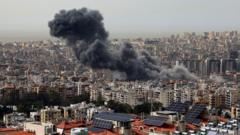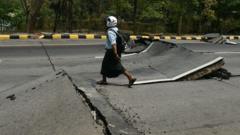Prime Minister Benjamin Netanyahu's $206 billion budget, with a significant military focus, passes amidst public protests and political challenges, raising concerns over ongoing hostages in Gaza.
Israel's Budget Boosts Military Spending Amid Ongoing Gaza Tensions

Israel's Budget Boosts Military Spending Amid Ongoing Gaza Tensions
Recent budget approval fortifies Netanyahu's political grip while signaling sustained military commitment.
In a strategic move, Israel's Parliament has approved a new budget that significantly strengthens Prime Minister Benjamin Netanyahu's control over the government and includes a dedicated allocation for military spending. The $206 billion budget passed with a vote of 66 to 52 after mounting pressures over public dissatisfaction and political opposition concerning Israeli hostages held in Gaza.
This budget approval comes at a critical time for Netanyahu, as the failure to pass it would have triggered early elections—an outcome the current coalition of right-wing parties could have poorly weathered. With this newfound security, Netanyahu is positioned to further define his administration's approach to both internal and external policies.
Michael Koplow, an analyst from the Israel Policy Forum, suggests that Netanyahu's next steps might range from intensifying populist agendas and military initiatives in Gaza to seeking a diplomatic resolution with Saudi Arabia. The outcome will likely reflect Netanyahu's personal political calculations rather than the demands of his coalition partners.
The budget's passage, however, has not gone without dissent. Public demonstrations took place outside Parliament, with protestors vocally demanding more immediate action regarding the hostages still in Gaza. With discussions for a cease-fire with Hamas seemingly stalled, there is an undercurrent of concern among Israelis, particularly over the safety of the remaining captives amid the resumption of military aggression. This scenario raises critical questions about the direction of Israel's policy and its implications for the region.




















